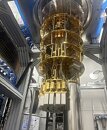
IBM and RIKEN Unveil First IBM Quantum System Two Outside of the U.S.
IBM and RIKEN, a national research laboratory in Japan, today unveiled the first IBM Quantum System Two ever to be deployed outside of the United States and beyond an IBM Quantum Data Center. The availability of this system also marks a milestone as the first quantum computer to be co-located with RIKEN's supercomputer Fugaku—one of the most powerful classical systems on Earth. This effort is supported by the New Energy and Industrial Technology Development Organization (NEDO), an organization under the jurisdiction of Japan's Ministry of Economy, Trade and Industry (METI)'s "Development of Integrated Utilization Technology for Quantum and Supercomputers" as part of the "Project for Research and Development of Enhanced Infrastructures for Post 5G Information and Communications Systems."
IBM Quantum System Two at RIKEN is powered by IBM's 156-qubit IBM Quantum Heron, the company's best performing quantum processor to-date. IBM Heron's quality as measured by the two-qubit error rate, across a 100-qubit layered circuit, is 3x10-3 (with the best two-qubit error being 1x10-3)—which is 10 times better than the previous generation 127-qubit IBM Quantum Eagle. IBM Heron's speed, as measured by the CLOPS (circuit layer operations per second) metric is 250,000, which reflects another 10x improvement in the past year, over IBM Eagle.
IBM Quantum System Two at RIKEN is powered by IBM's 156-qubit IBM Quantum Heron, the company's best performing quantum processor to-date. IBM Heron's quality as measured by the two-qubit error rate, across a 100-qubit layered circuit, is 3x10-3 (with the best two-qubit error being 1x10-3)—which is 10 times better than the previous generation 127-qubit IBM Quantum Eagle. IBM Heron's speed, as measured by the CLOPS (circuit layer operations per second) metric is 250,000, which reflects another 10x improvement in the past year, over IBM Eagle.























































